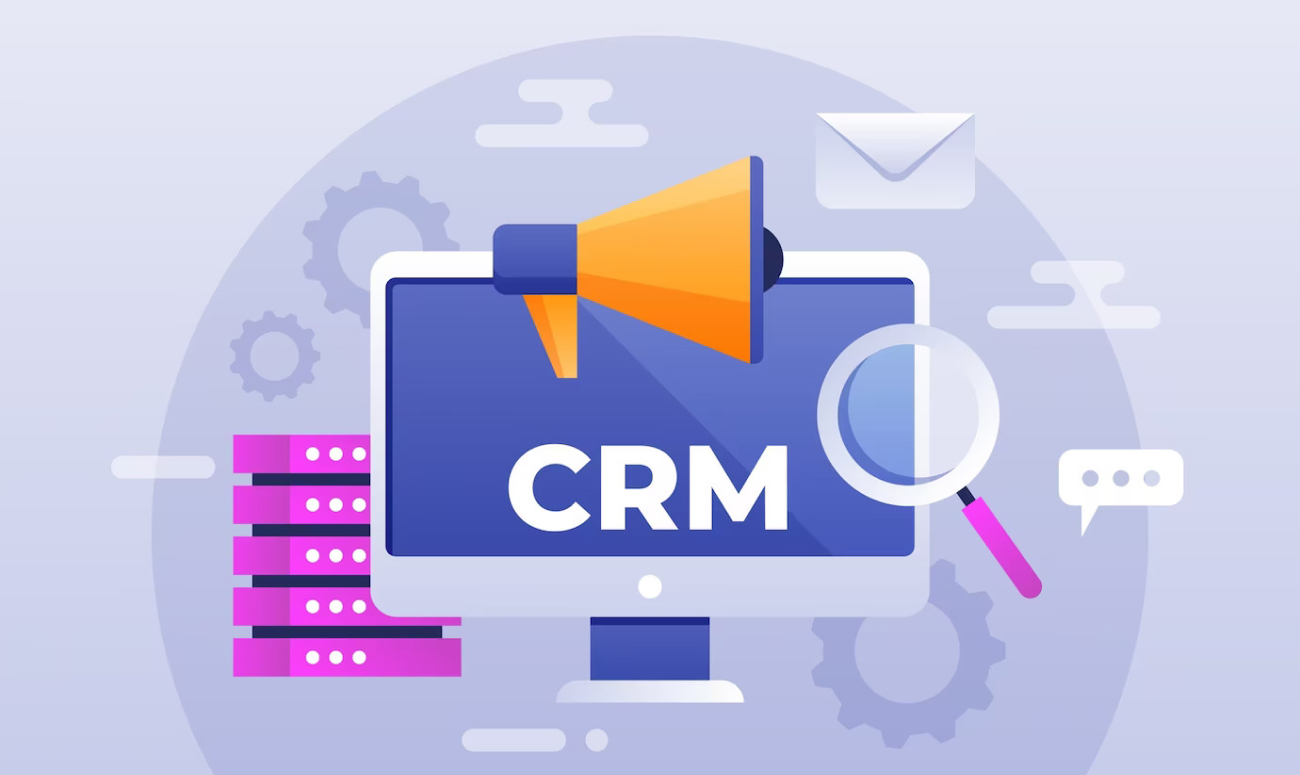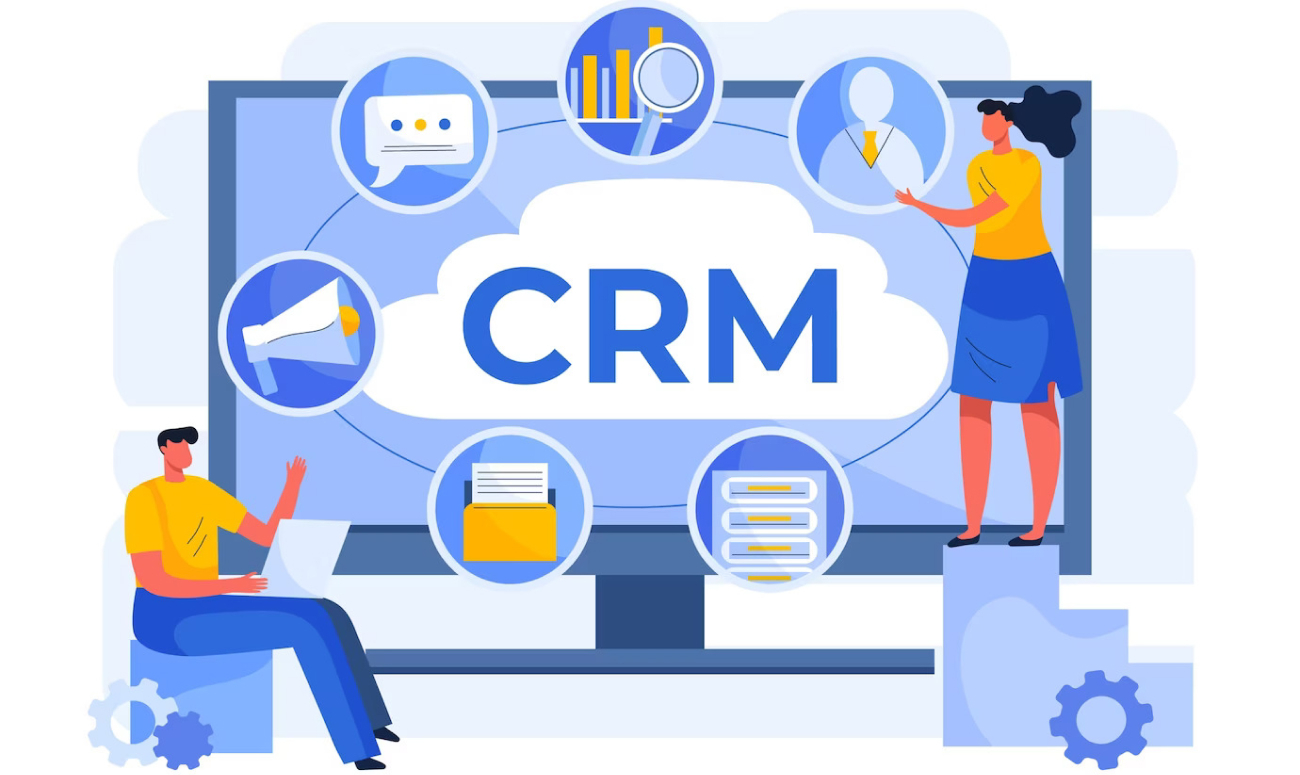
Are you a small business owner looking to increase sales? If so, implementing your organization’s proper Customer Relationship Management (CRM) system is essential. It can be daunting to stay on top of the latest marketing trends while managing day-to-day operations. However, a CRM can help you capture leads, automate mundane tasks, and improve customer service – all of which are essential components when it comes to boosting revenue. While there are no one-size-fits-all solutions, this blog post will guide you through what features to look for in a sales CRM for small businesses, and cover the importance of sales CRM features and functionality and why it’s essential for any small business looking to boost its sales.
Whether you’re just starting or transitioning from an existing platform, we’ve covered everything – so read on!
Importance of Sales CRM for Small Businesses
Sales CRM is one of the most essential tools for small businesses. It helps to streamline business processes throughout, stay organized, and drive sales growth. By utilizing a Sales CRM, small businesses can track customer interactions, identify potential customers and nurture relationships with existing customers. Additionally, it allows business owners to gain visibility into their sales pipelines and take proactive measures to improve sales performance.
Understanding the role of CRM in small businesses for sales strategies
For sales operations in a small business, Customer Relationship Management (CRM) plays a crucial role. As a result, the sales team can focus on more important things like selling. Having efficient customer data stored in the CRM platform helps sales representatives to close more deals and makes the whole process faster. For example, they can use customer data to know what kind of things the customer is interested in to ensure they are offering the right products or services. This way, they can reduce their sales time and sales lifecycle.
CRM has become much more than just managing customer data and relationships. It is now a powerful tool for small businesses to automate their processes, identify new sales opportunities, and boost overall performance. For example, with the help of advanced analytics, sales reps can gain deeper insights into customer behaviour and preferences, allowing them to create more targeted campaigns and increase sales conversions. Additionally, businesses use CRM to streamline operations and track customer support conversations for a better customer experience.
Many powerful features come with modern CRM platforms, from marketing automation to lead scoring to predictive analytics. These features allow businesses to understand their customers better and improve their services. By leveraging the latest technology, small businesses can quickly get real-time insights into customer trends to make informed decisions.
CRM is essential for any small business looking to grow its operations and succeed in today’s competitive climate. It provides businesses with the data they need to make better decisions while automating mundane tasks so that sales rep can focus on selling rather than administrative work. With the right platform in place, any business can leverage the power of CRM to maximize its growth potential. Moreover, with additional features like workflow automation in the same software platform, small businesses can expect much smoother transitions toward building a large corporation.
Additionally, Automation and customization features empower businesses to improve sales pipelines while scaling growth. With customizable dashboards and various integrations, the CRM platform is carving a place for itself as an essential investment in any serious sales strategy. With the right CRM solution, small companies have an attractive option for growing into large enterprises.
Benefits of CRM for small business owners

CRM solutions are a powerful tool that can help small business owners improve customer interactions and ultimately grow their businesses. Here are some of the benefits of CRM for small business owners:
Improves customer relationships: CRM allows you to keep track of all customer interactions, including purchases, inquiries, complaints, and feedback. As a result, it helps you understand your customers better and build stronger relationships with them.
Increases sales: With CRM, you can track customer preferences and buying behavior, tailoring your marketing and sales efforts to each customer. This personalized approach can lead to increased sales and revenue.
Streamlines business process: CRM can automate many routine business processes, such as manual data entry, and follow-up emails. It also automates sales processes, such as lead management and sales pipeline and management, workflow automation which can help sales teams frees up time to focus on more critical tasks and increase efficiency.
Improves customer service: With CRM, you can quickly access customer information and history, resolving issues faster and providing improved customer satisfaction and loyalty.
Providing a centralized platform to manage customer data: CRM allows you to store customer data in a central location, making it easy to access and analyze. This can help you identify trends, track performance, and make more informed business decisions.
Enhancing collaboration and teamwork: CRM software allows sales teams to collaborate with other departments, such as marketing and sales team, to share customer insights and coordinate efforts, leading to a more cohesive and effective sales strategy.
Improving customer engagement: With CRM software, sales teams can communicate with customers through various channels, such as email, phone, SMS, and social media, and track interactions, which can help them provide personalized and timely responses.
Enabling data-driven decision-making: By analyzing customer data and sales performance metrics, CRM software can help sales teams make informed decisions about sales strategies, such as which products to focus on, which sales channels to use, and which customers to target.
Facilitating sales forecasting: CRM software can help sales teams forecast sales revenue, track progress toward goals, and identify areas for improvement, which can help them adjust their sales strategies as needed.
CRM can be a valuable tool for small business owners looking to improve their customer relationships, increase sales, and streamline their sales processes.
How CRM helps streamline sales and marketing processes
Free CRM software can significantly impact streamlining sales and marketing processes. It helps unify customer data from sales and marketing, including marketing campaigns(Email marketing), website visits, purchase history, and more. This data gives sales teams improved visibility into the sales pipeline and the ability to accurately monitor various stages, making it easier to spot opportunities and create customized strategies. Advanced features of these free CRM software systems and tools include forecasting the length of a sales cycle, analyzing historical trends for better predictions, and gathering insight into future opportunities. With comprehensive insights into the sales funnel and forecasting capabilities at their fingertips, business owners gain a distinct competitive advantage that keeps their customers engaged continuously.
Improving Sales and Marketing with CRM
Using a CRM tool to improve sales and marketing processes can also help businesses (including small businesses) succeed by giving them greater control over customer interactions. For example, with advanced CRM tools, sales representatives can track leads, monitor customer preferences, and create targeted campaigns for each individual. This allows companies to build meaningful relationships with existing customers while building trust with potential ones.
Using CRM to manage customer interactions and leads

Implementing a sales automation platform such as a CRM can be a great way to manage customer interactions and leads at any company. To be successful, the process should start with sales representatives responding promptly. When new lead contacts your company, sales automation tools like CRM allow you to qualify, nurture, and score potential customers efficiently. Moreover, businesses deploy powerful sales acceleration tools such as Facebook lead ads or targeted sales campaigns to engage prospects in real-time.
Further customer communication should then be directed to the other sales reps or customer service team, depending on the information being discussed. Team collaboration is critical for effective sales automation and ensuring customers promptly receive all the features and assistance they need. With solid sales automation practices, companies can ensure their customer interactions and leads run smoothly.
Here are a few points of how CRM effectively manages customer data:
-
Track the sales pipeline to see how your team is performing and where improvements can be made.
-
Integrated email marketing makes it easy to keep in touch with customers and generate new leads.
-
Efficient workflow automation ensures that tasks are completed quickly and effectively.
-
Centralized data means that everyone on your team has access to the information they need.
Analyzing customer data to improve sales and marketing strategies

Utilizing all-in-one CRM software is an effective way for companies to improve their sales and marketing strategies. By analyzing customer data with these tools, businesses can gain valuable insight into current sales trends and create more targeted approaches to attracting customers. Furthermore, utilizing multiple sales pipelines allows enterprises to easily manage all incoming leads and develop customized strategies for each prospective customer. They provide a comprehensive overview of all customer interactions, enabling companies to identify potential sales trends and make timely changes to their sales and sales pipeline and management.
Lastly, it’s essential to provide all customers with accessible support through a dedicated customer service team that can answer inquiries quickly and effectively. It also provides marketers with real-time insights into the effectiveness of their campaigns. With all the right pieces in place, businesses will be able to refine their strategies over time, maximizing customer satisfaction and enhancing the company’s overall success.
Tracking customer behavior and preferences to personalize marketing efforts
The crucial phase for increasing sales of small businesses is analyzing various metrics to track the customer’s preferences and behavior to provide more personalized services based on their requirements. This will make them feel valued and foster brand loyalty. In addition, by collecting data from various channels and activities, such as social media likes, website visits, abandoned cart campaigns, and more, these analytics also aid in providing applicable discounts and coupons for the products and services they are interested in.
The following are the points to consider when using CRM for tracking customer behavior and preferences, helping them personalize marketing efforts more effectively:
Track customer satisfaction: Analyze and measure customer ratings, comments, and reviews to understand how customers respond to your products or services.
Monitor website activity: Keep track of customer behavior on your website, including page views, time spent on each page, and visitor path analysis.
Identify buying patterns: Analyze trends in the purchase history, such as total amount spent, average order value, frequency of purchases, and more.

Collect customer feedback: Gather responses from surveys or polls that you can use better to understand the needs and preferences of your customers.
Track marketing efforts: Monitor the results of campaigns by tracking clicks, open rates, and conversion rates for each campaign deployed in the market.
Analyze sales data & performance metrics: Determine which categories are performing well over time with detailed insights into revenue generation and other key performance indicators (KPIs).
A/B Test different versions: Create multiple versions of content or design elements, then test them against one another to determine which version performs best with users/customers.
Analyse competitors’ performance: Understand what is working for competitors and how their strategies compare with yours so you can stay on top of the competition.
By monitoring customer behavior and preferences, businesses can develop more effective sales strategies by tailoring their marketing efforts to specific audiences. By collecting data on customer interactions and using it to determine buying patterns, companies can create an individualized experience for each customer, resulting in increased satisfaction and loyalty.
Using CRM to enhance customer experience
In today’s highly competitive business landscape, ensuring exceptional customer service can be the key to attracting and retaining customers.
Managing customer data with a CRM system for a better customer experience
A CRM system offers several vital functionalities that aid in providing a better customer experience including:
Centralized Database
The CRM platform creates a centralized database that stores complete customer profiles, including personal information, purchase history, preferences, and prior interactions. This enables customer service representatives to access comprehensive customer data when handling inquiries or complaints, facilitating more personalized and informed customer interactions.
Automation of Routine Tasks
CRM systems can automate customer service tasks like sending acknowledgement emails, creating follow-up reminders, or updating case statuses. By automating these routine tasks, customer service representatives can allocate more time to addressing customer concerns, thus enhancing the overall customer experience.
Performance Analytics
CRM systems generate actionable insights by collecting and analyzing customer service data. This gives businesses valuable information to gauge customer service performance and identify improvement areas. By leveraging these insights, companies can continuously optimize their customer service operations to forge stronger customer relationships and build brand loyalty.
By utilizing a CRM system, businesses can effectively manage customer service operations, forging strong relationships with their clientele and ultimately boosting their bottom line.
Cost and ROI of CRM for Small Businesses:

As the competitive landscape intensifies, start-ups recognize the need to embrace technology and maintain strong customer relationships. In recent years, CRM systems have emerged as a powerful tool to help small businesses manage and optimize their clientele. However, the cost of a small business CRM implementation and its expected return on investment (ROI) must be assessed before any small business should invest in such a technology.
Calculating the costs of implementing and maintaining a CRM system
Let’s consider the following scenario: Boutique Bakes, a well-established small bakery, is contending with increased competition from large chain stores and recently-opened artisanal bakeries. The owner, realizing the need to stay ahead and maintain loyal customers, decides to implement a CRM system.
The study by Nucleus Research found that for every dollar spent on CRM implementation, the average returns are $8.71. Initially, this may seem promising for Boutique Bakes. However, various factors must be considered to assess a CRM system’s true ROI and cost.
CRM System Cost: Depending on the scale and functionalities required, the total cost of a CRM system can range from a few hundred to several thousand dollars per year. Boutique Bakes must consider the cost of software, implementation, training, and maintenance. EQUP, a popular CRM system, offers an annual subscription at affordable rates which is very beneficial for start-ups.
Employee Training and Adoption: According to CIO, about 69% of CRM implementation failures are attributed to employee adoption and training issues. Boutique Bakes must determine if their staff can learn and adapt to a new CRM system without disrupting day-to-day operations. But now, software that needs learning curves like EQUP, Active campaigns, and others is available.
Time and Resources: A successful CRM implementation is time-intensive and requires strategic planning. Boutique Bakes must consider the time and effort required to align CRM strategies with their overall business goals and the potential impact on employee workload.
With these considerations, Boutique Bakes can decide whether a small business CRM system is a suitable investment for their small business. To strengthen the argument for implementing a small business CRM system, it’s essential to focus on proven benefits such as improved coordination, increased productivity, and enhanced customer service. For example, one study by LinkedIn revealed that small businesses leveraged CRM systems to achieve a 26.4% increase in sales, a 66.5% increase in productivity, and a 74.2% improvement in accessing customer data.
In conclusion, small businesses like Boutique Bakes must carefully evaluate the cost and potential ROI of implementing CRM systems based on their unique circumstances. A well-executed CRM strategy can increase customer retention, improve efficiency, and boost profitability. However, considering factors such as CRM features, system cost per user, employee training, adoption, and the impact on time and resources will help small businesses make the right investment decision, ensuring they reap the benefits and avoid implementation pitfalls.
Factors to consider when selecting a Sales CRM for small business
When selecting a Sales CRM for your small business, there are certain basic features you should look out for. These include contact and lead, contact management, and lead generation, scoring and tracking, automated emails, customer segmentation, reporting, and analytics capabilities. Here are a few factors every small business owner should focus on :
Budget and pricing: One of the primary factors to consider when selecting CRM software for small businesses is the overall cost. Look for CRM solutions that offer transparent pricing without hidden fees or lengthy contracts, and ensure it suits your budget.
Scalability and customization: As your small business grows, your own CRM features and requirements may evolve. Choose a CRM solution that offers scalability and industry-specific customization options so that you can adapt it to your changing needs.
Integration capabilities: Ensure that the CRM software you select can easily integrate with other critical tools and applications that your business uses.
User experience and ease of use: Your employees should be able to use the CRM software without extensive training efficiently. Look for comprehensive, free CRM and solutions with an intuitive interface and user-friendly features, reducing the learning curve for your team.

Reporting and analytics: Robust reporting features are essential for understanding your sales performance and making data-driven decisions. The CRM software should offer customizable reports and dashboards to help you track critical sales metrics and make informed decisions.
Mobility and accessibility: In today’s ever-connected world, accessing your CRM from multiple devices and locations is crucial. Select a CRM solution that offers mobile accessibility or a dedicated smartphone app to keep your sales team connected and informed on the go.
Security and data protection: Customer data is vital for your business, so choosing CRM software that prioritizes data security and safety is essential. Look for CRM platform providers with stringent security measures and compliance certifications.
Customer support and training resources: Having reliable customer support and ample training resources is essential when implementing a new CRM system. Choose a CRM solution with accessible customer support and a wide range of training resources, such as video tutorials and knowledge databases.
Industry-specific features: Some business CRM and solutions cater to specific industries or niches, offering specialized tools and functionalities tailored to those sectors. Determine whether a technical business CRM solution would be more advantageous for your business than a general-purpose one.
Customer testimonials per user, and reviews: Do thorough research and read what other small businesses have experienced with the CRM software you’re considering. Look for customer testimonials per user, and reviews to gain insights into the software’s real-world performance and suitability for your business.

EQUP All-in-one free CRM, an exceptional solution in customer relationship management, boasts a multifaceted approach that caters to all essential features required for selecting an optimal sales CRM without compromising brevity. It is bolstered by sales analytics, seamless communication, contact management, collaboration, security, flexibility, and an exceptional user experience. EQUP CRM is one of the best free CRM tools(best CRM software) where you have a dedicated account manager and the most efficient customer service teams and customer support features. As a result, it positions itself as the premier choice for organizations seeking to enhance their sales performance and achieve sustainable success.
Final thoughts

CRM is an invaluable tool for small businesses that want to increase sales and streamline their sales processes. Sales automation, business relationships, and customer communication are all critical components of CRM that can help business owners improve their bottom line.
CRM’s features and marketing capabilities help streamline the sales process, centralize customer data, automate routine tasks, reduce silos, and provide a specific answer to serve customer needs better. In addition, it can provide broad capabilities that will help you increase order sizes, close deals faster, and cultivate customer loyalty.
Moreover, adopting a suitable CRM system for your small business can improve customer satisfaction and loyalty if you’re looking for the best CRM software to increase your team’s productivity and turn sales from intangible goals into tangible results. With this technology, companies can make real-time changes to customer data, maximize their marketing efforts, and gain greater insight into current and potential customers. Several software companies are available, but consider getting the perfect CRM software for your small business to boost your sales today! All it takes is one click: click here to get the best sales CRM software now!
Read more – About various Cost-effective CRM software for your business growth.